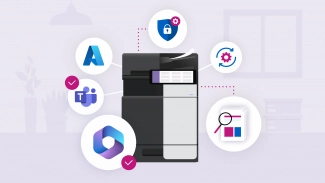Názory k článku Fedora 8: nekonečno na dosah ruky
-
Článek je starý, nové názory již nelze přidávat.
-
Robert (neregistrovaný)Hezky clanek od Kloboucnika :). Spousta veci uz na SUSE funguje davno, ntfs-3g je zalezitosti kernelu, YUM manazer ve srovnani se Smartem vyvolava usmev. Davno resil zavislosti mezi baliky Yast, URPM od mandraku, nez Cerveni Klobouci zjistili, ze to jde i jinak, nez se rucne prokopavat dependencies hell. V dobe, kdy na Suse uz bylo default UTF-8, kamos na nejnovejsi Fedore (Red-Hat) o utf jeste nemel potuchy, a jel na isoxxxx. ATD...
-
fedorak (neregistrovaný)no neviem ake mas informacie ale ja som dlho hladal distribuciu ktora mi vyhovuje.
poziadavkom bolo to aby bola FULL UTF-8 a aby som nemusel sahat na instalaciu a vsetky zavislosti sa dotahovali automaticky.
toto vsetko potrebujem koli tomu ze so systemom potrebujem pracovat a nie sa starat o jeho chod. fedora toto pre mna splna od zaciatku ako bola vydana (co zial ostatne systemy nesplnovali a skusil som vsetky zname distra). utf-8 funguje perfektne na vsetkych urovniach, este sa mi nestalo ze by sa mi nieco nenainstalovalo aj ked sa jednalo o nie-oficialne repository fedora.
fedora sa mi osvedcila ako vyborny system pre vyvoj enterprise aplikacii. vsetko co bezi na "velkych enterprise OS" bezi aj na fedore. to sa tyka pracovnych (vyvojovych) stanic a samozrejme serverov a ich aplikacii.
samozrejme je tu aj negativum a to je nemoznost prehravat muziku a videa, ale ak stroj beriete ako prostriedok prace a nie zabavy tak to az tak nevadi.
zaverom .... ja pouzivam fedoru aj kem mozem pouzivat win pretoze mi viac vyhovuje a je pre moje ucely vykonejjsi, a holt pre manzelku a mamu mam specialny stroj kde je win a mozu si tam veselo instalovat virusy ako len chcu a kedy chcu. -
 ani by som nereagoval nebyt tych 2 poslednych riadkov, mam stroj s vistou ktory bezi pol roka na verejnej IP iba s antivirom avast home vsetko ostatne okrem aplikacii je zakladna instalacia, system za ten cas nenapadol jediny virus alebo spyware...
ani by som nereagoval nebyt tych 2 poslednych riadkov, mam stroj s vistou ktory bezi pol roka na verejnej IP iba s antivirom avast home vsetko ostatne okrem aplikacii je zakladna instalacia, system za ten cas nenapadol jediny virus alebo spyware...
p.s. moj primarny os je momentalne F7 a momentalne zvazujem o upgrade -
Pavel 'TIGER' Ruzicka (neregistrovaný)Pro mne stale nejlepsim OS z Redmondu zustavaji Windows 2000 (IMHO uz tento system byl dost stabilni i kdyz jsem nemival ani vetsi problemy s radou 9x - Me). Vistam chybi hodne, ale hodne k odladenosti. Navic nez bych si je upravil k obrazu svemu,asi by mi to nejaky cas zabralo, a za to mam platit ??? To si radeji vyberu nejakou Linuxovou distribuci ktera bude nejblize mym predstavam a doupravim si ji. Apropo, nemate externi Firewall, ja jsem si na test nainstaloval pc s Vistou, soupl jsem tam Avast home, soupl to pred externi firewall (IPCop) a za ctrnact dni uz se tam nejake svinstvo objevilo. Pochopitelne vsechny aktualizace od MS se prubezne nainstalovali.
-
Robert (neregistrovaný)Proc by UTF nemelo fungovat? Ma kamaradka pouziva SUSE od verze 9.2 (sama si to nainstalovala) jako jediny OS, uz jsi presne nepamatuji, protoze je to nekolik let, jak tam instalovala Mplayer a kodeky, nicmene to tam dostala bez problemu s navigaci po icq nebo po telefonu. Nepotrebovala nikdy Windows. Se zmenou HW pouze preinstalovala na suse 10.2 a spokojene bezstarostne pouziva k beznym vecem, jako je torrent, net, icq, office, video, hudba, foto, vypalovani, dekodovani DVD... Obcas se ji do ruky dostanou XP, a brbla na to. To same mama. Vyfasovala ode mne notebook, a bez nuceni tam ma XP pouze na zabirani mista na disku.... Kloboucnici nepochopi....
-
Michal Vojan (neregistrovaný)Snadno? Proc maji balicky rozstrkane do tisicu repozitaru? Pekne me to otravuje, kdyz musim hledat konkretni balik, ve kterem repozitari se asi nachazi. A pak musim kazdy jednotlive zadavat do yastu. Jinak suse celkem dobry, i kdyz radeji pouzivam fedoru. Zatim. Uvazuji o necem vic hardcore, ale na zkouseni mi moc casu nezbyva.
-
Robert (neregistrovaný)netusim. Ma to zase asi vyhodu v tom, ze neztahujes metedata 10.000 balicku, ale jen toho repozitare, co potrebujes. Nevim, jaky konkretni balik mas problem najit. Packman a Guru (nyni od 10.3 uz jen Packman) je zaklad, no a pak podle popisu na opensuse.org. Bud to chces, nebo ne.... Kdyby ty baliky vsechny byly na 1 servru, zase by xxx lidi brecelo, proc maji v repozitari uplne vse, a musi to kvuli toho tak streaaaane dlouho updatovat.
-
Michal Vojan (neregistrovaný)Bylo to myslene obecne, ale kdyz uz... tak ted jsem treba narazil na cairo. Nevim, do ktereho repozitare mam jit, ani podle odhadu. Diky tomuhle rozdeleni treba neco chci nainstalovat, pricemz pak musim dohledavat odkud vemu knihovnu, na ktere ten balik zavisi. No a vcera mi to bohuzel zadnou zavislost ani neukazalo, kdyz jsem aktualizoval firefox, takze ho mam ted nefunkcni. Pouzivam tedy packmana, guru i opensuse.org. Diky roztristenosti tech repo na opensuse pak vidim jakesi zmatky pri aktualizaci.
-
Robert (neregistrovaný)Netusim, co mas za verzi distra. SUSE 10.2 nebo 10.3 se zapnutymi repozitari Update, Packman, Guru a Mozilla bez problemu. Bez problemu je to i bez techto repo. Vyzkouseno. Nevzpomenu si, ze bych po nejake aktualizac mel FF nefunkcni. Podle http://software.opensuse.org/search je cairo standartne v SUSEdistru.
-
Michal Vojan (neregistrovaný)Tak cairo byl zrovna jen priklad a vsichni se toho chytli. Ovsem realny priklad a mel bych jich vic. Verzi mam 10.2 a cairo mam po nejakem updatu 1.4.10-5.3. Ovsem ted mi yast pise, ze dostupna verze je pouze 1.4.10-5.1, tedy nizsi. Nevim, odkud se vzala ta novejsi, taham jen z vyse uvedenych zdroju. Dokud se instaluje jen z distribucniho adresare, je to ok, problemy se ukazuji az pri aktualizacich. Ten vyhledavac je fajn, jenze mi nerekne, co se v repozitarich objevilo za novinky, tak jak to dela treba yast. Ale aspon jsem se z nej ted dozvedel, kde je ta verze cairo, coz je unstable repozitar. Z nej jsem ale nic netahal, tak nevim.
Kazdopadne by nebylo od veci mit dve ruzne varianty repos pro aktualizace, rozdelenou, jako je to ted, a spojenou, kde by to bylo vsechno dohromady. Ja bych ji upradnostnil. Na Fedore to tak mam a jsem spokojeny. -
Michal Vyskocil (neregistrovaný)
Ne, ze by Suse nemelo problemy, ale zrovna cairo?
$ zypper se cairo * Načítají se nainstalované balíky [100%] S | Repozitář | Typ | Jméno | Verze | Arch --+-------------------------------------------------------------------+---------+--------------------+-----------+------- i | openSUSE-10.3-OSS-KDE 10.3 | package | cairo | 1.4.10-25 | x86_64 | http://download.opensuse.org/repositories/openSUSE:10.3/standard/ | package | cairo | 1.4.10-25 | i586 i | http://download.opensuse.org/repositories/openSUSE:10.3/standard/ | package | cairo | 1.4.10-25 | x86_64 i | openSUSE-10.3-OSS-KDE 10.3 | package | cairo-32bit | 1.4.10-25 | x86_64 i | http://download.opensuse.org/repositories/openSUSE:10.3/standard/ | package | cairo-32bit | 1.4.10-25 | x86_64 | http://download.opensuse.org/repositories/openSUSE:10.3/standard/ | package | cairo-devel | 1.4.10-25 | i586 ....
-
 Pokud chcete nainstalovat Cairo, tak spusťte instalátor softwaru a nahrajte příslušný balíček, který se nachází ve standardním repozitáři (případně na instalačním DVD). Proč jste to tak neudělal?
Pokud chcete nainstalovat Cairo, tak spusťte instalátor softwaru a nahrajte příslušný balíček, který se nachází ve standardním repozitáři (případně na instalačním DVD). Proč jste to tak neudělal? -
 Většina balíčků je již ve standardních repozitářích. Vyhledat balíček a nainstalovat kliknutím na ikonku s odkazem (aniž byste musel cokoliv ručně přidávat a nastavovat v YaSTu) lze z webového rozhraní. Dostupný je také seznam s popisem repozitářů.
Většina balíčků je již ve standardních repozitářích. Vyhledat balíček a nainstalovat kliknutím na ikonku s odkazem (aniž byste musel cokoliv ručně přidávat a nastavovat v YaSTu) lze z webového rozhraní. Dostupný je také seznam s popisem repozitářů. -
 Tuto poznamku prilis nechapu. Neopak - Fedora umoznuje pres yum aktualizovat prakticky z jakekoli verze na jakoukoli verzi. Neni to jen oficialne podporovana vlastnost. Napr. u Ubuntu je podporovana, ale pouze mezi plne aktualizovanou predposledni a posledni verzi. Jak jsou na tom ostatni bohuzel nevim, ale docela by me to zajimalo.
Tuto poznamku prilis nechapu. Neopak - Fedora umoznuje pres yum aktualizovat prakticky z jakekoli verze na jakoukoli verzi. Neni to jen oficialne podporovana vlastnost. Napr. u Ubuntu je podporovana, ale pouze mezi plne aktualizovanou predposledni a posledni verzi. Jak jsou na tom ostatni bohuzel nevim, ale docela by me to zajimalo. -
Robert (neregistrovaný)Tohle SUSE umi od nepameti - od me pameti je to nekolik let. Co ja pamatuji, snad od 8-ckove verze. To je jako objevit spalovaci motor. Fedora nebyla nikdy pokrokova distribuce. Spis Mandrake, za nim SUSE. To co resi mi kamaradi na Fedore jako problem, na SUSE to funguje jako samozrejmost. S Mandrivou jsem momentalne mimo misu. Nevim.
-
 Pokud mate o SuSE prehled, nevahejte a napiste o jeho prinosu pro Linux clanek - myslim to vazne. Rad si ho prectu.
Pokud mate o SuSE prehled, nevahejte a napiste o jeho prinosu pro Linux clanek - myslim to vazne. Rad si ho prectu.
K SuSE 8.0 nemuzu uz v podstate nic najit. Poznamky k vydani RH8.0 jsou na http://www.redhat.com/docs/manuals/linux/RHL-8.0-Manual/release-notes/x86/. Obe distribuce vysly zhruba ve stejnou dobu. -
Robert (neregistrovaný)Pane Boze, ja Suse 8.0 nevidel nekolik let. Ja si uz nevzpomenu konkretne srovnat SuSE8.0 a Redhaty. Jednak mam pamet asi jako ryba (3 sekundy), a tehdy jsem byl uplna Lama. To bych musel vytahnout instalacky z krabice (jako ze ji mam za 1.500kc), a prubnout to, co to umi. 9.2 jsem mel spokojene na notasu skoro 3 roky, nez jsem to kvuli nejakym zavislostem na na novych aplikacich preinstaloval na 10.3.
-
 Pokud lze otázku propojit a vztáhnout také k Novellu, sponzorovi (open)SUSE, tak například: linuxové jádro, GCC, OpenOffice.org, KDE (mnoho let nejvýznamnější sponzor, zaměstnává nejvíce vývojářů, kteří přímo pracují na KDE), GNOME, Tomboy, F-Spot, Banshee, Beagle, (K)NetworkManager, Kickoff, SLAB, Evolution, XEN, Xgl, Compiz, AppArmor, Banter a mnoho dalších včetně Open Invention Network. Kromě toho Novell například také zaměstnává vývojáře linuxového jádra Grega Kroah-Hartmana (správce PCI, USB, základních ovladačů, jádra sysfs...) a umožňuje mu vylepšovat kompatibilitu hardwaru v rámci projektu Linux Driver Project.
Pokud lze otázku propojit a vztáhnout také k Novellu, sponzorovi (open)SUSE, tak například: linuxové jádro, GCC, OpenOffice.org, KDE (mnoho let nejvýznamnější sponzor, zaměstnává nejvíce vývojářů, kteří přímo pracují na KDE), GNOME, Tomboy, F-Spot, Banshee, Beagle, (K)NetworkManager, Kickoff, SLAB, Evolution, XEN, Xgl, Compiz, AppArmor, Banter a mnoho dalších včetně Open Invention Network. Kromě toho Novell například také zaměstnává vývojáře linuxového jádra Grega Kroah-Hartmana (správce PCI, USB, základních ovladačů, jádra sysfs...) a umožňuje mu vylepšovat kompatibilitu hardwaru v rámci projektu Linux Driver Project. -
 Z těch významnějších projektů jsem zapomněl ještě třeba na openSUSE Build Service.
Z těch významnějších projektů jsem zapomněl ještě třeba na openSUSE Build Service. -
 Bez konkrétního zdroje, který by informoval o tom, co všechno (počet vývojářů, projektů, doba, objem financí) a jakým způsobem se započítalo jsou ta předhozená čísla téměř k ničemu. Podobná bych si mohl vymyslet taky a pak je dávat do diskusí. Je také dobré si uvědomit, že řada projektů by bez firemního zázemí asi vůbec nevznikla (případně se zpožděním a v horším stavu) anebo by neměla dobře organizované vedení. Dobře je vidět například na Firefoxu.
Bez konkrétního zdroje, který by informoval o tom, co všechno (počet vývojářů, projektů, doba, objem financí) a jakým způsobem se započítalo jsou ta předhozená čísla téměř k ničemu. Podobná bych si mohl vymyslet taky a pak je dávat do diskusí. Je také dobré si uvědomit, že řada projektů by bez firemního zázemí asi vůbec nevznikla (případně se zpožděním a v horším stavu) anebo by neměla dobře organizované vedení. Dobře je vidět například na Firefoxu. -
Jarda (neregistrovaný)Ja jsem vzdycky RedHat, potazmo Fedoru vnimal spis jako (pro me) rozumny kompromis mezi progresivni/experimentalni a overenou/stabilni distribuci...
Jinak upgrade z radku mezi verzemi distra mam vyzkouseny od RH 7.2 po FC6 a prochazelo to bez problemu. Jediny zadrhel byl prechod LILO - GRUB... -
 Nevivm nevim jak je ntfs-3g zalezitost kernelu - fuse bylo podporovane uz davno pres ntfs-3g a ntfs-3g prave vubec neni zalezitost kernelu. Smart je pouze frontend k dalsim nastrojum, jeho srovnani s yumem je tedy zcela mimo - mozna jste ho chtel srovnavat s pirutem - zde je smart rozhodne lepsi - nebo s packagekitem a pak je to opet mimo. V reseni zavislosti skutecne fedora prventsvi nema, a yast i urpmi se o to snazili drive - zhruba ve stejne dobe se o to snazil i yum - akorat ne na fedora - fedora ho je prebrala a vyrazne vylepsila. V F8 se yum rychlosti dostal vyrazne bliz apt. Yast ma jeste co dohanet.:)
Nevivm nevim jak je ntfs-3g zalezitost kernelu - fuse bylo podporovane uz davno pres ntfs-3g a ntfs-3g prave vubec neni zalezitost kernelu. Smart je pouze frontend k dalsim nastrojum, jeho srovnani s yumem je tedy zcela mimo - mozna jste ho chtel srovnavat s pirutem - zde je smart rozhodne lepsi - nebo s packagekitem a pak je to opet mimo. V reseni zavislosti skutecne fedora prventsvi nema, a yast i urpmi se o to snazili drive - zhruba ve stejne dobe se o to snazil i yum - akorat ne na fedora - fedora ho je prebrala a vyrazne vylepsila. V F8 se yum rychlosti dostal vyrazne bliz apt. Yast ma jeste co dohanet.:)
S UTF8 me presvecte. Prvni distribuce ktera ve vychozi instalaci pouzivala UTF8 byl Red Hat 8.0. Provozovat lze do dnes Fedoru s latin2, takze pokud jej kamarad preferuje je to ok, nevypovida to ale nic o tom, kdo tahl vlak zmen ve jmenu utf8. Ostatne detaily teto trnite cesty jsou dostupne v clancich na netu. -
Robert (neregistrovaný)nejsem si zcela jisty, kdo tahl vlak zmen ohledne UTF8, nerad bych se hadal. Ono to uz je vlastne jedno ;). UTF uz mam ve vychozi instalaci hodne dlouho, takze uz si nevzpomenu od kdy. Vzpominam si pouze, ze jsme to kdysi s kamaradem Kloboucnikem resili (ja UTF on ISO). Ale to uz je hooodne davno. Smart (na SUSE) srovnavam proti apt-get (z PClinuxOS), a YUM (FedoraX? - co ma muj spolubydlici a kamarad), ale s YUMem maji dost problemu. Smart je puzzle python-xxx, ale funguje velmi dobre. Yast jako balickovac je kapitola sama o sobe. Nicmene jsem chtel rict, ze Fedora prevratne distro neni. Radil bych ji spis mezi "klasiku", podobne jako Debian :). Oba mi kamaradi se vetsinou divi, co uz je u mne noveho, pak to po nejakem case dojde k i k nim. Pouze ma zkusenost. NTFS-3g neverim, ze by bylo zalezitosti prave volby distribuce.
-

Red Hat Linux 8.0 (September 2002) was the first distribution to take the leap of switching to UTF-8 as the default encoding for most locales. The only exceptions were Chinese/Japanese/Korean locales, for which there were at the time still too many specialized tools available that did not yet support UTF-8. This first mass deployment of UTF-8 under Linux caused most remaining issues to be ironed out rather quickly during 2003. SuSE Linux then switched its default locales to UTF-8 as well, as of version 9.1 (May 2004). It was followed by Ubuntu Linux, the first Debian-derivative that switched to UTF-8 as the system-wide default encoding. With the migration of the three most popular Linux distributions, UTF-8 related bugs have now been fixed in practically all well-maintained Linux tools. Other distributions can be expected to follow soon.
UTF-8 and Unicode FAQ -
cgrim (neregistrovaný)Stale jako mali kluci: "moje auticko je hezci, hec!", "a moje rychlejsi!", "tvoje neumi zatacet!", "tvoje zase nema motor!" ...
Vam asi jeste nenalejou co? Jinak bych Vam doporucil zajit do hospody, kam se podle meho nazoru hodi diskuse tohoto stylu mnohem vic. Mohl byste si s kamaradem prisednout k tipkum, co se dohaduji o tom, zda je lepsi Sparta nebo Slavie :) -
Kaa (neregistrovaný)mno, nedá mi to po přečtení diskuse se vrátit k této vaší první reakci a konstatovat že tu plácáte výmysly z rukávu místo předložení důkazů. Hlavni si plácnout do klobouku. Ale my se podivných jestěrek nebojíme :-)
a) s UTF8 jste se pěkně seknul .. suse mělo UTF8 o 1,5 roky později .. možná kolega na novou verzi RH UPGRADOVAL to pak zůstane nastavení systému stejné
b) teda napsat, že ntsf-3g je záležitost kernelu muže jen někdo, kdo ví lautr h.. co je ntfs-3g. :-) z toho je vidět, že narychlo plácáte, hlavně abyste si do klobouku plácnul :-)
Pokud se týká balíčkování .. ano, RH nebyl nikdy moc na špici, nabíjí si hubu tím že používá stále jeden z nejstarších balíčkovacích systémů. Ale kloboučníci můžou být spokojeni, že se standardním repos a livnou si v yumexu nakliká všechno u úplný BFU .. a vo vo vo tom to je :-) -
 Michal SmržStříbrný podporovatelNechápu, jak někdo může článek hodnotit méně než za 1. Výborná práce a určitě se na Fedoru kouknu.
Michal SmržStříbrný podporovatelNechápu, jak někdo může článek hodnotit méně než za 1. Výborná práce a určitě se na Fedoru kouknu. -
anonymníCodecBuddy ma tiez trochu sklamal, nie vsak principom (juzrov treba vzdelavat, aj ked sila fedora trhu sa so silou win32 trhu neda porovnavat a wmv bude este nadlho primarnym kodekom) ale tym ze ponuka len platene kodeky (vynimkou je mp3 ktory davaju zdarma). Ale on ten reverse engineering asi musi niekto zaplatit...
-
Kaa (neregistrovaný)Bohužel, Fedora je v područí USA, kde se přehání a nechce porušit Digital Millennium Copyright Act. více na http://fedoraproject.org/wiki/ForbiddenItems
Bohudík, ke standardnímu repository stačí přihodit repos Livna a odtud dotahnout nonfree Multimedia a drivery.
Já osobně v tom nevidím žádný problém. Jediný největší problém pro laika je stáhnout a přidat rpm s definicí livna repo. Pak už si jen pustí yumex a může si vybírat co hrdlo ráčí.
Dokonce vzniká na kde-apps jakýsi klikací pomocník easyfed, kde si nakliká, co z ForbiddenItems chce doinstalovat a on to zařídí. -
rich (neregistrovaný)"Jediný největší problém pro laika je stáhnout a přidat rpm s definicí livna repo"
Hned jako prvni odkaz po zadani do googlu je domovska stranka livna repository kde jsou odkazy na rpm balicky pro jednotlive verze fedory.
Takze v tomto pripade uz staci jenrpm -Uvh http://rpm.livna.org/livna-release-8.rpm
Takze ja v tomhle problem nevidim ;-) -
 Miroslav SuchýStříbrný podporovatelTen artwork, co se vam tak libi, me na svedomi zrovna zminovana Máirín.
Miroslav SuchýStříbrný podporovatelTen artwork, co se vam tak libi, me na svedomi zrovna zminovana Máirín.
K tomu upgrade pomoci yumu doporucuji clanek Devina Goodwina, ktery si to vyzkousel:
http://dgoodwin.dangerouslyinc.com/live-yum-updates-for-fedora-8
http://dgoodwin.dangerouslyinc.com/more-fedora-live-upgrades-discussion -
SAL (neregistrovaný)Upgradol som uz 2 pocitace na Fedoru 8 a mal som len 2 prolemy, oba sposobene tym, ze som upgradoval pred oficialnym vydanim a repozitar livna este nebol aktualny.
Pokial nepouzivate repozitare hore dole, ale mate v tom system (napr. ja pouzivam len Fedora, Livna, svoj salstar.sk a velmi zriedka nejaky iny), tak "yum upgrade" prejde bez problemov.
Pokial si nahodite yum-merge-conf plugin, tak sa dokonca opyta na kazdy zmeneny konfiguracny subor, co s nim chcete robit, popripade zobrazi jeho diff. -
anonymníUpgradoval jste z F7, nebo z neceho starsiho? Mne ted ceka upgrade nekolika stroju (FC4, FC5) na F8, a zurive premyslim, zda tak cinit z DVDcka ci yum-em, a jak na to. Hlavnim kriteriem je, aby nastaveni a konfigurace dotycneho stroje zustalo v nejvyssi mozne mire zachovano (s vyjimkou pripadu, kde doslo k tak zasadnim zmenam, ze rucni zasahy ex-post do prislusnych konfiguraku jsou nevyhnutelnou nutnosti).
Ondyno jsem zkousel jeden FC3 server povysit pres DVD na CentOS5. Trochu skoda, ze instalator/Anakonda necha cloveka projit veskere nastaveni (sit, cas, partitions, boot, etc.), a teprve pri vlastnim aktu instalace to zacne chroupat a premyslet nad dependencies ... aby to za par minut vyplivlo : "Installation aborted due to following errors:" (nebo tak nejak) ... s veselou pointou v tom, ze ten vycet chyb (zrejme tedy nevyresitelnych dependenci) byl prazdny.
To mne trochu zklamalo; cekal bych, ze upgrade z CD/DVD media bude prubojnejsi, protoze narozdil od yuma to nemusi resit za "realneho behu" v init 3/5, a mohlo by si to tudiz dovolit nevyresitelne dependence suse preplacnout novym balikem z media. Nevim ...
Kazdopadne, pokud jste nekdo podobny problem resil (ve stylu "jak rychle, efektivne a bezpecne upgradovat Fedoru ob jednu az nekolik verzi"), budu povdecen za jakykoliv postreh, radu, zkusenost. -
Pavel (neregistrovaný)
Musim priznat, ze me popisovane zmeny prijemne prekvapily. Moje pocity z pouzivani Fedory 7 jsou totiz dost smisene. Osobne mi vadi predevsim:
- Zamereni na Gnome. Samozrejme se da pouzivat i KDE, presto mam pocit, ze Gnome predstavuje vyladenejsi variantu.
- System aktualizaci je uplne peklo. Kazdy tyden se stahuje alespon 100 MB balicku. Opravdu netusim, co vyvojare vede k nutnosti aktualizovat BIND minimalne 2x tydne, kernel kazdy tyden. Navic neexistuji delta baliky, stahuje se vzdy cele rpm. Vyvojari zastavaji filozofii nejnovejsich balicku, na rozdil treba od Opensuse, ktere prohlasi jednu verzi za stabilni a potom uvolnuje jen opravy (nebo backporty oprav), krome vyjimecnych pripadu, kdy se meni verze balicku. Fedora u mnoha baliku instaluje stale nejnovejsi verze (tyka se treba jadra). Nektere veci po upradech prestavaji fungovat. Napr. mne ted Fedora pri provadeni ukoncovacich skriptu firewallu vyhazuje chybu, protoze nejde odstranit (unload) nektery modul iptables.
- Konfigurace je kapitola sama pro sebe. Zkuste nastavit firewall. Graficka utilita system-config-security vam neumozni rozumne zabezpecit cokoli jineho, nez typicky desktop. Zapomente na to, ze byste meli moznost zaridit treba NAT. Na druhou stranu konfigurace v textovych souborech (pripadne nekde ve skriptech) je taky komplikovana, protoze pri prvnim ulozeni pravidel v system-config-security je cely soubor s pravidly pro firewall prepsan, takze asi tusite, kde vase rucne vytvorena pravidla ted jsou. Distribuce je tedy na pul cesty, snazi se zajistit konfiguraci v GUI, ktera je zatim nepouzitelna a navic vam znemoznila pouzit rucni konfiguraci.
-
 ad 1. souhlas - KDE v soucastnosti vlastni stagnaci zaostava.
ad 1. souhlas - KDE v soucastnosti vlastni stagnaci zaostava.
ad 2. to je typicka vlastnosti Fedory - v prubehu zivota jedne verze se aktualizuje veskery software. Pokud chcete mene aktualizaci pouzivejte verzi o jednu starsi nez je aktualini. Jine distribuce dodavaji behem zivota verze pouze bezpecnosti aktualizace, coz je sice mene aktualizaci, ale dava to mensi moznost progresu
ad 3. souhlas - graficke nastroje nemam rad a nepouzivam, jsou urceny uzivatelum s minimalni znalosti, proto toho moc nenabizeji. Co se konfigurace FW tyce v F8 by tento nastroj mel byt podstatne vylepseny. -
Robert (neregistrovaný)Hezky receno. Co se tyka Grafickych nastroju: jasne, kdyz vis, jak to a kde napsat do konfiguraku - super. Za to, ze dnes jsem "Linux-only" vdecim pouze grafickym nastrojum z dob Mandrake8.1. Dnes uz umim prokopat se konfigurakem a radeji pouziju prikazovou radku, ale tehda.....
-
 2. Rozdílové aktualizace se nestihly dopracovat, měly by být v dalším vydání Fedory (9). Ty podporovalo už SUSE 9.3 v říjnu 2004, ale třeba Ubuntu se o nich ve svých plánech zatím ani nezmiňuje.
2. Rozdílové aktualizace se nestihly dopracovat, měly by být v dalším vydání Fedory (9). Ty podporovalo už SUSE 9.3 v říjnu 2004, ale třeba Ubuntu se o nich ve svých plánech zatím ani nezmiňuje. -
Adam (neregistrovaný)ad 1. Kazde distro ma svoje defaultni prostredi. A o zadnem se neda rict, ze je lepsi nez druhe, proste kazdy ma to svoje a na nem si najde tech 100 pro oproti jinemu :)
ad 2. Tak to pravdepodobne pouzivate vyvojovou vetev Fedory. Stabilni vetev tolik aktualizaci proste nema, tomu neverim. Souhlasim, ze s updatovanim jadra to muze byt problem, ale to je dan za to, ze mate "neco vic nez ostatni". Ona Fedora vzdycky byla o novych featurach nez o stabilite.
ad 3. graficke utility jsou predevsim pro zacatecniky uzivatele, kteri o textove konfiguraci nic nevi a chteji aby jim to jelo. Pro pokrocilejsi konfiguraci samozrejme plati, ze si ji proste musite napsat
Mne osobne se Fedora velmi libi, protoze jine distribuce proste nejsou tak v predu. Samozrejme, ze se mi taky stava, ze neco nejede, ale to uz je holt dan za ty featurky :) -
 1. Proč nepíšete pravdu? Třeba openSUSE žádné výchozí prostředí nemá a velká pozornost je věnována jak GNOME tak i KDE.
1. Proč nepíšete pravdu? Třeba openSUSE žádné výchozí prostředí nemá a velká pozornost je věnována jak GNOME tak i KDE. -
drak89 (neregistrovaný)odkaz jsem si precetl, anglicky umim. suse nabizi gnome i kde, skoro tri ctvrtiny suse uzivatelu pouzivaji kde. fedora take nabizi gnome i kde, kolik procent uzivatelu pouziva co nevim (asi to bude opacne). tak kde je ten rozdil?
(na okraj - nejsem (pravidelny) uzivatel zadne z techto distribuci a ani jednoho de (jsem spokojeny s kombinaci arch + fluxbox)) -
n00b (neregistrovaný)Takže to co napíše distrowatch je pravda? Respektive co je anglicky a na jiném serveru je PRAVDA? Ty tvoje linky už nikoho nezajímají, akorát zdůrazňují tvoje malé sebevědomí, protože na tebe každý kašle.
Raději si dej vyhledat své jméno + blbec. Možná ti pak dojde jak trapný už si. Ale nebude to anglicky.
to all: IGNORE HIM! -
drak89 (neregistrovaný)ach boze, vypada to, ze jsem narazil na svateho suse bojovnika...:P poprve jste reagoval na adama, ne na me... ano, adam se (v jistem slova smyslu) mylil, nicmene hlavni vyznam 1. bodu jeho prispevku je ten, ze kazdemu vyhovuje jiny de a je jeho vec, po kterem sahne... vasi oblibenou distribuci tim patrne ohrome urazil, protoze je to distribuce, kde vyvojari venuji kazdemu z de presne 50 % casu vyvoje, aby zadnemu nenadrzovali:))
muzete mi poslat hromadu odkazu, kde bude u fedory napsano: "default de gnome" a u "suse default de -" a stejne me nepresvedcite, protoze v praxi to tak neni. jak na suse tak na fedore muzu mit kde i gnome. u fedory podle cd, ktere chytnu pri instalaci do ruky (F-7), u suse asi vyberem pri instalaci (nevim, neinstaloval jsem, vzdy jsem prisel k hotovemu). fedoru jsem pouzival opravdu jen kratky cas a vzdy s kde, na tom dw nic nezmeni:)
k spekulacim o "poctu vyvojaru, mire intregrace, dotazenosti a odladenosti" nemam co dodat, cast je ciste subjektivni, k casti mi chybi presna cisla. -
 Jistěže nemáte čísla, protože Fedora vždy byla a je především GNOME - centrická distribuce. To, zda tam jde doinstalovat nebo nejde na tom nic nemění. A máte nějaké divné chápání pojmu mýlit se a v jistém slova smyslu, protože to, co napsal, není pravda. Tečka, o tom nelze dále diskutovat a pokud to chcete zpochybňovat, pak jste tady vy tím fanatickým krátkozrakým bojovníkem.
Jistěže nemáte čísla, protože Fedora vždy byla a je především GNOME - centrická distribuce. To, zda tam jde doinstalovat nebo nejde na tom nic nemění. A máte nějaké divné chápání pojmu mýlit se a v jistém slova smyslu, protože to, co napsal, není pravda. Tečka, o tom nelze dále diskutovat a pokud to chcete zpochybňovat, pak jste tady vy tím fanatickým krátkozrakým bojovníkem. -
 SuSE vzdy byla KDE centricka, az kdyz do nej vstoupil Novell, zavedl do SuSE 50:50 gnome a podle meho skromneho odhadu bude Novell gnome prosazovat cim dal vic. Tzn. Novell se bude starat o Gnome a komunita o KDE - tak to je i u Fedory akorat Novell se vymeni za Red Hat. Zadna firma nebude udrzovat dve prostredi pro krasu necich oci a KDE je licencne komplikovane. Zatim ho Novell KDE trpi jen proto, ze byvali zakaznici SuSE byli na KDE zvykli.
SuSE vzdy byla KDE centricka, az kdyz do nej vstoupil Novell, zavedl do SuSE 50:50 gnome a podle meho skromneho odhadu bude Novell gnome prosazovat cim dal vic. Tzn. Novell se bude starat o Gnome a komunita o KDE - tak to je i u Fedory akorat Novell se vymeni za Red Hat. Zadna firma nebude udrzovat dve prostredi pro krasu necich oci a KDE je licencne komplikovane. Zatim ho Novell KDE trpi jen proto, ze byvali zakaznici SuSE byli na KDE zvykli. -
 Je pravda, ze GNOME je esova karta velkych hracu ve svych enterprise produktech (Red Hat, Novell, Canonical...) a Ti budou mit velky zajem, aby byla v bezplatnych edicich GNOME venovana minimalne stejna pozornost GNOME jako KDE, a pokud mozno i vetsi. Coz by mohlo vest k vetsi odladenosti i vylepsenim. Na druhou stranu se osobne tesim na KDE4, protoze prichazi s radou dobrych napadu a v otazce vzhledu a pouzitelnosti se postupne priblizuje i GNOME, tak jsem zvedav, jake budou ohlasy a jak to cele dopadne.
Je pravda, ze GNOME je esova karta velkych hracu ve svych enterprise produktech (Red Hat, Novell, Canonical...) a Ti budou mit velky zajem, aby byla v bezplatnych edicich GNOME venovana minimalne stejna pozornost GNOME jako KDE, a pokud mozno i vetsi. Coz by mohlo vest k vetsi odladenosti i vylepsenim. Na druhou stranu se osobne tesim na KDE4, protoze prichazi s radou dobrych napadu a v otazce vzhledu a pouzitelnosti se postupne priblizuje i GNOME, tak jsem zvedav, jake budou ohlasy a jak to cele dopadne. -
Kaa (neregistrovaný)Hele jsem si uz dementní nebo co, ale furt jsem nějak nepochopil, proč je Fedora Gnome-centrická distribuce. Chápal bych to, kdyby na instalačním mediu bylo pouze Gnome.
- protoze má Gnome implicitne zaskrtnuto při instalaci ? nevím, vzdycky jsem to odškrtnul a zaškrtnul KDE, v tom nevidím Gnome-centrismus.
- protože rh-system-gui nástroje (asi) používají GTK ? mně je to fuk .. a připadá mi to málo na takové tvrzení ..
- Další jiná kritéria jako UŽIVATEL NEVIDÍM .. nějaká čísla o vývojářích jsou mi ukradená. Házím to do jednoho pytle "komunita vývojářů". Je mi fuk, kolik jich tam je zadarmo a kolik placených přidala nějaká firma. Bylo to její rozhodnutí a asi z toho něco má (nebo nemá).
Máte jakýsi stranný pohled na věc, jakoby z pohledu nějaké distribuce. Můj nestranný pohled je, že desktopy (Gnome,KDE) vyvíjí "komunity" nezávislé na distribucích, které je jen použijí. Pokud někdo z komunity distribuce dělá něco pro komunitu desktopu, to uz je podivné zamotáváni vztahů. Když půjdu pomoct sousedovi vytlačit z garáže jeho Opla, taky někdo nemůže říct, že jsem Opel-centrický.
Takže z mého pohledu je Fedora k desktopům (včetně xfce) rovnostářská.
> Výchozím prostředím Fedory je GNOME a je mu věnována největší pozornost. Naopak openSUSE žádné preferované výchozí prostředí nemá. <
Jestli se opravdu tolik tlučete v prsa jen kvuli tomu, že Suse na rozdíl od Fedory nemá implicitně zaškrtnuté ani jedno z těch dvou pojebaných zaškrtávátek, tak to jste asi fakt Suse-pako .. :-D jako fakt, ale to pak beru jako fanatismus .. hehe .. kvůli jednomu pojebanemu zaškrtávátku .. no ja se snad posměju .. LOL .. Protože jiný rozdíl uživatel nevidí .. ty kecy o pozornosti si můžete schovat, nikoho nezajímají :-D -
vlasta (neregistrovaný)Ja bych teda rek ze fedora neni GNOME-centricka o nic vic nez suse. U obou si pri instalaci vyberu co chci za prostredi a na fedore jsou obe prostredi aktualizovana stejnou merou hned jak vyjde nova verze. A to ze muzes doinstalovat druhou variantu kdyz si ji nevyberes pri instalaci snad neznamena ze to musis delat pokazdy kdyz KDE chces ;-)
-
Kaa (neregistrovaný)Nechápu jaká CD s fedorou se vam pletou do ruky. Asi to nejsou standardni instalační média. Ze standardního instalačního media Fedory si VŠICHNI můžou VYBRAT mezi Gnome a KDE při INSTALACI.
A bylo to tak vždycky. Stačilo zaškrtnout, že chci vybírat balíčky teď a tam změnit desktop. -
Kaa (neregistrovaný)Rozdíl je v:
- počtu vývojářů - co pro mně tento údaj přináší jako uživateli např. KDE ??? NIC .. protože ze společného vývoje toho desktopu mají výsledky všechny distribuce které ho zaintegrují i kdyby na něm vubec nijak nepracovaly. prostě pletete jablka s hruškama .. jen abyste vyzdvihl, jak chlebodárce Vašeho Suse je skvělý a platí haldu vývojářů. Proč nám to vůbec cpete ?? zajímá to někoho ?? NE .. když mám zájem na podpoře distra/desktopu, zašlu jim nejaké drobné. Co dělají firmy je jejich věc. A vy se jděte s tou vaší propagandou Novell/Suse VYCPAT. A já vyspat.
- v míře integrace - ?!?!?! prostě je tam ten balík desktopu v té distribuci .. nechápu co tím myslíte .. asi něco etérického nadčasového což my běžní praktičtí useři nemáme šanci pochopit ..
- dotaženosti a odladěnosti - to přece nemá žádnou souvislost s distribucí KDE 3.5.6 je úplně stejné ve Fedore jako v Suse -
michich (neregistrovaný)Ve Fedoře je dostupný plugin yum-presto, který umožňuje rozdílové aktualizace. Není sice ještě podporován oficiálně, ale když jsem ho na F7 zkoušel, tak fungoval dobře. https://hosted.fedoraproject.org/projects/presto/
-
Matej (neregistrovaný)ad 2) Fedora je a byla developerská distribuce, s čímž souvisí poměrně živé updaty. Také se mi to moc nelíbí, ale vzhledem k tomu, že se Fedorou živím, tak to celkem snesu. Když ale teď budu upgradovat manželce počítač (měla tam Fedoru Core 6), tak asi pravděpodobně nedostane Fedoru, ale CentOS. (nemohu si odpustit rýpnutí, kdepak je á la CentOS distribuce založená na SLESu?).
ad 3) To máte tak. Buď máte nastavené řešení nebo si uděláte něco sám. Ten původní system-config skutečně není moc velká sláva a právě proto má F8 nový system-config-firewall, který by měl být mnohem flexibilnější. Ale stejně není nad ruční práci (a navíc ono to zas není tak složité; můj aktuální iptables-script je na http://www.ceplovi.cz/matej/tmp/iptables-script -- ve značně rozdrbané podobě, ale funkční). -
Kaa (neregistrovaný)1. vyladěnost desktopu až příliš nesouvisí s distribucí
2a. TO je fedora .. hýbe se změnami, pokud chcete něco co se pohne jednou za měsíc, zkuste nějakého lenochoda či chameleona ;-)
2b. hmm .. misto výkřiků nad objemem každodenních updatů .. což takhle auto-update vypnout a updatovat si ručně třeba v klikáním v yumexu 2x do měsíce ?? dělám to tak už přes 2 roky a plná spokojenost .. nevím, ale přístup evereyday-full-auto-update mi připadá jako chování tupé ovce ve stádu. Ani ve widlows jsem nepovoloval automatický update. Nikdy nevíte co vám přestane fungovat a protože nevíte kdy přesně to nastalo, nevite kam se máte vrátit. To není správná cesta. Ale jednodušší :-)
2c. s kernelem bývám nejopatrnější .. vždy pár dnů počkám a) až k němu bude na livně driver k nvidia (mrchy jsou čímdal rychlejší, občas je tam i dřív) .. b) případně jestli si nějaký rychlý mladý iniciativni blbec na nové verzi nenabil ústa .. tuto testovací proceduru jim rád přenechávám, raději fedorku provozuji ;-)
3. chcete-li klikací nástroj nezávislý na distribuci, zkuste webmin. Nastavíte tam i ten NAT a další věci kolem sítě. A nejen to. Já ho na pár mašinách mám a iptables se tam nastavují jednoduše a přehledně. Přiznám se, že jsem ho začal používat i sám, ačkoliv jsem ho tam dával původně pro méně zdatné spolu-"adminy". -
Yenya (neregistrovaný)"protože alsa umí, pokud se správně využije, v podstatě vše, co sound server"
Tak to bych chtel autora videt jak donuti samostatnou ALSU delat to co umi PulseAudio: napriklad za behu prepnout vystup beziciho mplayeru na jinou zvukovku (dokonce i po siti), videt ktere zvukove servery jsou na lokalni siti dostupne (pres Avahi), umoznovat menit aplikacim hlasitost, aniz bych to tem aplikacim musel rikat (prichazi mi VoIP hovor, tak chci naraz ztlumit proste vsechno co kde do repraku hraje a nehledat kde to vlastne ma okno), mit zvlast nastavenou a zapamatovanou hlasitost pro ruzne aplikace (dokonce i ruzne pojmenovane streamy, napriklad ruzne pisnicky), presmerovat VoIP hovor do bluetooth headsetu ktery jsem v prubehu hovoru konecne po kapsach nasel a zapnul, atd.
Navic ALSA na spouste zvukovek nema funkcni pristup vice aplikaci (ano, existuje dmix plugin, ale ten zase neumoznuje pristup vice uzivatelu, protoze SHM segment nema spravna prava), a tak podobne (chcete-li mit takove ty hot-switching sessions jako ma Apple, bez podpory vice zaroven prihlasenych uzivatelu se neobejdete).
A kdyz toho vseho budete schopni bez upravy aplikaci (PA je kompatibilni s ESD), je to jeste dalsi bonus navic.
-Yenya, http://www.fi.muni.cz/~kas/blog/ -
Yenya (neregistrovaný)ALSA mozna mela byt vic nez obycejnym ovladacem, ale nezvlada to. Viz pristup vice uzivatelu a podobne. Cili nechme ALSU delat to co zvlada, a to co nezvlada a ani zvladat nemuze (knihovna bez externiho demona nemuze rozumne zvladat pristup vice uzivatelu) dejme do samostatneho demona
o vrstvu vys. Po ALSA knihovne prece nemuzeme chtit aby pres D-Bus/HAL vyhledavala nove pripojena BT sluchatka a po kazde aplikaci ktera pouziva ALSU prece nemuzeme chtit aby implementovala (idealne to stejne) menu pro presmerovani zvukoveho vystupu. Toto je fakt lepsi delat samostatnym demonem
na urovni uzivatelovy session, zvenku vsech aplikaci.
-Yenya -
snajpa (neregistrovaný)Víte co nepobírám?
Vždycky, když se objeví článek přímo se dotýkající konkrétní distribuce, _vždycky_ se najdou tací, co tvrdí:
"používám distribuci xxx, ta vaše je o ničem, xxx rulezzz!"
Sakra, používám to, pro co jsem se rozhodl. Ostatní taky používají to, pro co _oni_ se rozhodli.
Nevidím důvod proč někomu kecat do toho, co používá za distribuci, nebo že to, co používá za moc nestojí.
Koneckonců můžem být rádi, že používá linux, ne?
Ať si klidně používá co chce, když to vyhovuje. -
MPosp (neregistrovaný)Absolutní souhlas ... pokud administruji XX serverů RHEL různých verzí, je Fedora na mém desktopu logickou volbou. Zkoušel jsem Gentoo, SuSE a další, ale když každá distribuční větev si obvykle řeší umístění i strukturu konfiguráků jinak, kdo má pořád "přepínat" v těhle rozdílech? V principu je linuxák s několikaletou praxí schopen během chvíle obhospodařit jakoukoli distribuci, ale má-li fungovat efektivně, měl by na svém desktopu používat distro co nejbliží těm, které má na hrbu ... IMHO :o)
-
Martin (neregistrovaný)Phonon není sound server, ale multimedia API pro KDE 4 - http://en.wikipedia.org/wiki/Phonon_(KDE)
-
pajout (neregistrovaný)Fedoru pouzivam dlouho, tak nejak od RH5, a mam ji celkem rad, ale ten NetworkManager, to jsem teda nikdy nepochopil, co tim kdo chtel rict. Jo, a rozdelovani disku na partice behem instalace (mluvim o F7 a predchozich), to je taky tak, ze oni vedi lip nez ja, v jakym poradi tam ty partice chci.
Jinak, clanek byl fajn, na 8 prejdu samozrejme az budu muset. -
 Padla tu řeč o balíčcích s jadernými moduly. Z minulosti vím, že některé extrné Fedora repozitáře (ne Livna, ano ATRpms, DAG a další) nabízely balíčky pro systém DKMS, což je to nejlepší co se pro Linuxové systémy a jejich uživatele v současnosti nabízí. Doufal jsem, že by se tento systém mohl časem dopracovat do mainstreamu. Zjevně se tak nestalo, to je škoda...
Padla tu řeč o balíčcích s jadernými moduly. Z minulosti vím, že některé extrné Fedora repozitáře (ne Livna, ano ATRpms, DAG a další) nabízely balíčky pro systém DKMS, což je to nejlepší co se pro Linuxové systémy a jejich uživatele v současnosti nabízí. Doufal jsem, že by se tento systém mohl časem dopracovat do mainstreamu. Zjevně se tak nestalo, to je škoda...
V současnosti tento systém běžně využívá Mandriva a PCLinux a nemohu si stěžovat. Je to sice takový kompromis, ideální je když se kód dostane přímo do jádra, to nepopírám, ale to někdy trvá, kvůli licenci, kvalitě kódu atd. Jako uživatele mě ale hlavně zajímá, "aby to fungovalo". -
 Chtěl bych se zeptat, ovlivňuje fedora životnost disku u notebooků stejně jako Ubuntu?
Chtěl bych se zeptat, ovlivňuje fedora životnost disku u notebooků stejně jako Ubuntu?
Chci přejít na linux, a windows jen kvuli maličkostem chci běhat ve virtuálu. Navíc mi na mojí x3100 nejede blender, což je otřesná chyba intelu, pod Vistou jde všechno OK, ale licenci mám jen na XP Pro. Pokud máte radu, prosím napiště. -
Jirka (neregistrovaný)ahoj vsichni, mam problemek s instalaci fedory 8, stahnul jsem full dvd i live cd a zacal s instalaci,kdyz jsem se dostal k casti s diskama byl jsem prekvapenej, zadnej tam nebyl. Zkusil jsem starou instalaci fedory 7 a ten muj disk rozpoznal,dal jsem zkusil instalaci z live cd a to same zadny disk, zkusil jsem i naformatovat celej disk a nic,asi je problem s driverem sata_sis nevim jak ho resit...koukal jem ze pri instalaci muzu nahrat vlastni driver pomoci prikazu linux dd hledam na netu sata_sis z fedory 7, nevite o nejakem odkazu?jestli mate stejny problem a prisli jste na to, tak se pls ozvete, predem dik.(Mam Maxtor 250gb, deska ASUS P4S800D-X) BTW. zkousel sem instalaci na notebooku se sata a instalace probehla OK.





















